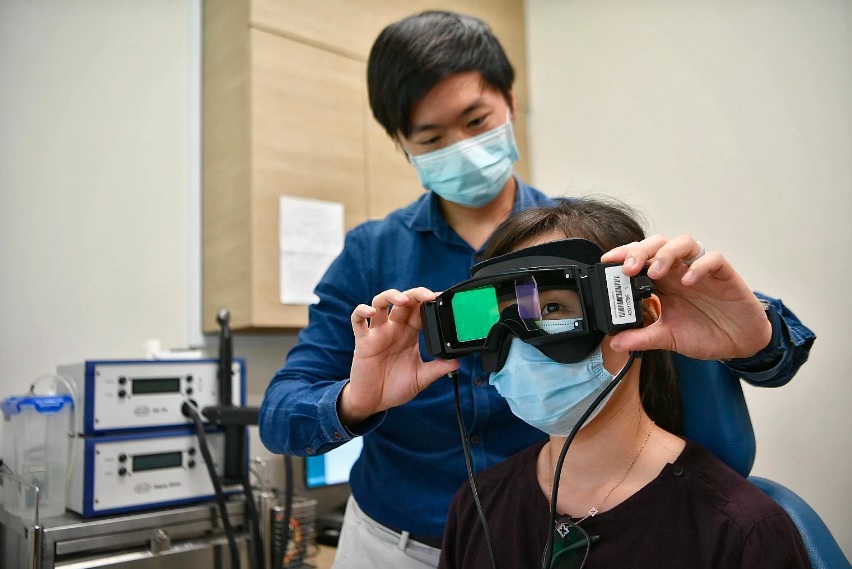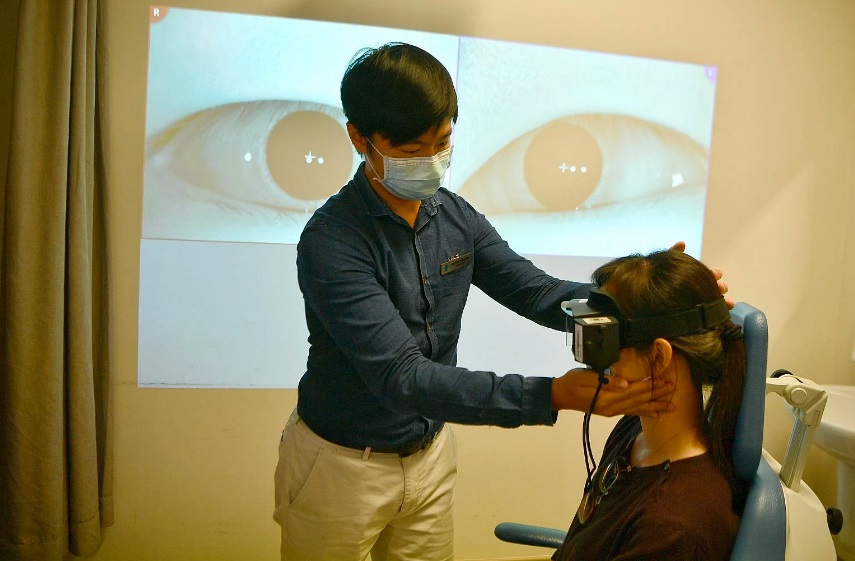Senior Audiologist Kenneth Chua performing the caloric test at the Giddiness Counselling Clinic in Changi General Hospital Medical Centre on June 27, 2022. ST PHOTO: ARIFFIN JAMAR
SINGAPORE - At 3am one day in October 2018, website administrator Ernie Suryana was awakened by a sudden bout of dizziness - something she had not experienced before.
Too dizzy to sit or walk, the then 39-year-old crawled to her bedroom door and banged on it to wake her family and get help.
After a hospital stay and three months of physiotherapy, she felt better. But her symptoms later returned, with a series of tests unable to pick up any apparent cause.
"It was causing me a lot of anxiety, because I was feeling giddy and everything was spinning again," said Ms Ernie.
Ms Ernie is not alone in her condition.
She is one of some 650 patients who have been treated by the dizziness counselling service at Changi General Hospital (CGH) since October 2020, who experience giddiness with no apparent cause.
Dr Kenneth Chua, senior audiologist at CGH who heads the service, explained that such patients have a condition that differs from vertigo, which is one of the more well-described conditions under the umbrella of dizziness.
In the case of vertigo, patients often feel that the room is spinning or objects they are looking at are moving very quickly, and this is accompanied by observable signs in the eye.
"If someone were to look into your eyes at that moment, your eyeballs would be jumping around," explained Dr Chua.
Vertigo can be detected through a variety of tests, including videonystagmography procedures, which is a test that measures a type of involuntary eye movement that causes one's eyes to move from side to side or up and down, or both.
However, about 70 per cent of those sent for such tests at CGH's Department of Otorhinolaryngology - Head and and Neck Surgery come back with no abnormal results in their tests. Dr Chua explained that a majority of such patients, like Ms Ernie, have what is known in layman terms as chronic subjective dizziness.
Patients' experiences of this condition tend to differ, but they often describe it as feeling like they are floating or as though their heads are "swimming".
Ms Ernie said: "I was really worried that I might faint in the middle of a crowded train or a mall, so I tried not to go out as often."
Dr Chua said that chronic subjective dizziness, also known as persistent postural perceptual dizziness, was only recently recognised as a condition, with diagnostic criteria for it being developed only in 2018.

Dr Kenneth Chua performing the vestibular function test at Changi General Hospital Medical Centre on June 27, 2022. ST PHOTO: ARIFFIN JAMAR
While it is not known how many people in Singapore suffer from it, studies in Britain have estimated that about 10 per cent to 20 per cent of the population there may have this condition.
Chronic subjective dizziness is the result of a combination of psychological and physical factors, said Dr Chua.
He explained that while in some cases there are no identifiable underlying medical issues causing the dizziness in patients, some of the patients will have had some history of underlying vestibular issues, although these would not be present at the time of their chronic subjective dizziness.
The condition's exact causes are unknown as well, but people who tend to be more anxious about their health and have previously had a vestibular illness are more prone to developing it.
Other factors such as stress and sensory overload may increase the chances of patients feeling giddy as well, said Dr Chua, adding that from April to September last year, CGH saw 200 such patients, up from 120 during the same period in 2020.

Vertigo can be detected through a variety of tests, including videonystagmography which measures involuntary eye movement. ST PHOTO: ARIFFIN JAMAR
Though the condition may never fully go away, patients can be taught to manage it through a series of techniques including educating them on the issue to reduce their anxiety, deep breathing exercises and cognitive behavioural therapy.
They may also be given simple exercises to improve their sense of balance.
Dr Chua said people who experience daily dizziness for three months and have already been told by doctors that there is no evidence of medical issues should seek help for chronic subjective dizziness.
"Treat dizziness seriously. It's quite hard to determine on your own if it's something urgent, so when in doubt, seek medical attention," he said.
In Ms Ernie's case, seeking treatment has helped put her mind at ease and allowed her to resume her normal life once more.
"I can now go out with friends and take public transport regularly again - I don't feel anxious anymore," she said.
SOURCE: THE STRAITS TIMES SINGAPORE PRESS HOLDINGS LIMITED, REPRODUCED WITH PERMISSION
